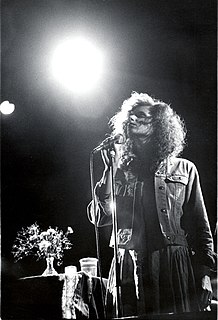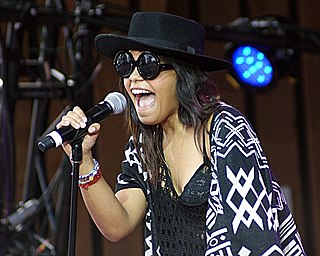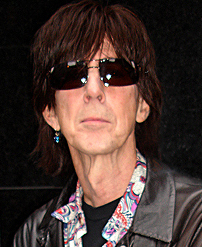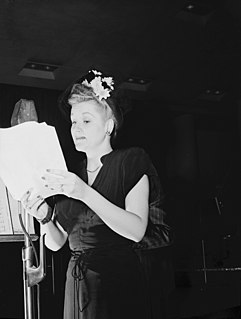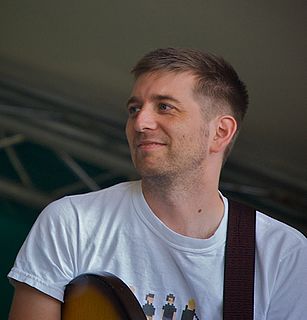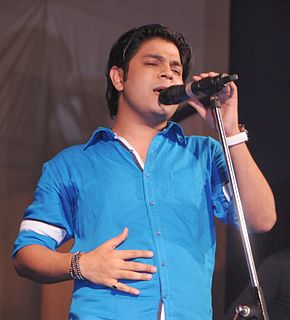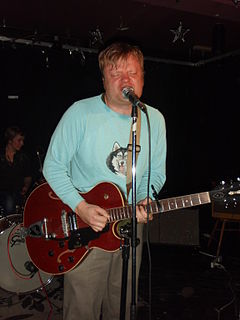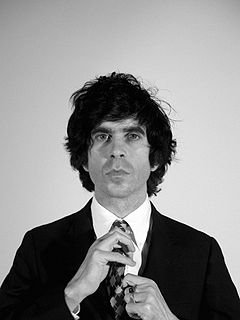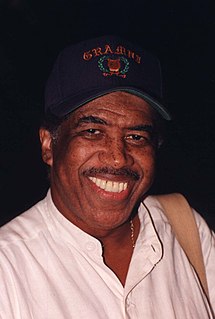A Quote by Moby
There are certain songs that if people come up to me and tell me how much that song meant to them, I think, You should have better taste, then, because I don't really like that song.
Related Quotes
I think being a singer-songwriter... your job is to tell a story that other people can't really tell themselves. And I really hope that people kinda go: "This happened once and I kind of like this song because I relate to it..." So if at least one of my songs over this tour's that song, then that's really cool.
Well, you know, when you're putting together a show, you've got to be careful not to load it up with the new stuff. We have to play the songs that people want to hear, too. People may come thinking, "Oh, I've just got to hear this song." Or maybe they'll write me a letter saying a certain song is really meaningful to them, so we'll be sure to play those songs.
Certain songs have a life, and certain songs don't. A song is like a saddle: you ride it for a while, and if it's the right kind of song you can sing it for the rest of your life. And then other songs are only really important for certain periods of your life, and you move on from them and find yourself not necessarily needing to sing them anymore.
The best thing you can do for a song is to hear it on the radio and to imagine what it could mean to you and then kinda forget the words. Just imagine how you felt when you heard it, if it was one of your songs. If it became one of your songs. If it meant whatever it meant for you and as soon as you see the visual, you get a rapid eye movement relationship with the song instead of an imaginative one. I think that can be dangerous because I don't think I'd want to be listening to a song on the radio and thinking about the video. Whatever that one interpretation was
Often for me, if I hear a song I know, it clicks for me and I hear it in a different way and I think, "I could sing that song. I've got something to say about that song. Wanting to connect with an audience and wanting them to rethink songs; it is actually important to do songs they're familiar with. Also, I love those songs. In a way, I think I've changed people's perceptions of what a cabaret show like this could be.
I would only listen to certain things, like a lot of teenagers do. But the Tragically Hip is a ribbon that's been with me pretty much my entire musical life. Every mix tape I ever made had at least one Hip song on it. Right from the outset I feel like Gord Downie built so much room into his songs. There was so much space in them that he created. He made me think of songwriting as full of boundless possibilities in a way that - well, that a lot of songwriters do, but that was the first time I thought a song could really contain multitudes.
If you're somebody who writes songs or writes fiction, a writer that people pay for your opinion in any way, you shouldn't be the least bit uncomfortable giving it to them. People want songwriters to tell them how they think and how they feel. That's what a song is. That's what I want to hear in a song.
I'm really happy that people are starting to hear my band, and we are so happy to be conduits for all this other happiness, and this emotional response. So, I can't be like, "that doesn't matter to me, I'm an artist, I exist apart from that!" But on the other hand, if you buy into that too much, you're setting yourself up... if I start thinking, "well, people at the show really liked one song, maybe I should write more songs like that," then I'm in trouble.
I love lyrics. I've always been averse to the straight lyric idea. I guess a big part of it is, that songs that are literary always turn me off. Because they feel so abstract. Like a song. What is a song? We have to remember what the function of a concert and the function of playing a song for people are. It's all become really abstracted.
An audience will let you know if a song communicates. If you see them kind of falling asleep during the song, or if they clap at the end of a song, then they're telling you something about the song. But you can have a good song that doesn't communicate. Perhaps that isn't a song that you can sing to people; perhaps that's a song that you sing to yourself. And some songs are maybe for a small audience, and some songs are for a wide audience. But the audience will let you know pretty quickly.
I think that the song, the song "Stand By Me" is one of those songs that... and someone asked me, what was you thinking about or what was you feeling about? It's something that, songwriters just write songs. It's like an artist that paints. They paint what they feel. It's not, it's not about how many of these painting I'll sell it's just how they feel at the moment. And that's how I wrote "Stand By Me".



